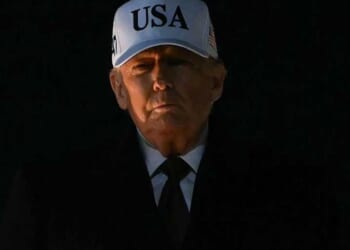Secretary Hegseth’s secretive meeting with all senior officers tomorrow is likely about President Trump’s proposed national security strategy.
There is, right now, a document bouncing around the Pentagon’s elephantine bureaucracy that has yet to be revealed but has already sparked a high degree of fear and loathing among the professional pearl-clutching set in Washington.
Last week, part of the document, which was drafted under the supervision of current Undersecretary of Defense for Policy Elbridge Colby, was leaked to Politico. Much to the consternation of Washington’s professional class, the document hints at a significant strategy shift in which the United States will effectively deprioritize its European, Middle Eastern, African, and Indo-Pacific areas of responsibility in favor of Western hemispheric defense.
Pete Hegseth’s Strategic Reprioritization
Rumors abound that Secretary of Defense (and now “Secretary of War”) Pete Hegseth’s secretive meeting in Quantico, Virginia tomorrow, in which all of America’s generals and flag officers and key members of their staffs stationed in all corners of the world will convene in a rare meet-up, is about the proposed national security strategy memo. Because this memo is such a sea change from the last 80 years of US grand strategy, it will likely require a high degree of handholding from the secretary.
Beyond the proposed reorganization of US strategic priorities and resources, it is expected that Hegseth will likely use this possible reorganization of the US military’s combatant commands and overall strategy to pressure elements in the highest ranks of the uniformed military to either retire or risk being fired.
The uniformed leaders who, through the Trump administration’s own as-yet-undeclared rubric, are deemed to be impediments to military readiness will soon face immense pressure. Of course, it should come as no surprise that President Donald Trump—who has had a famously stormy relationship with some of his former generals—wants to purge admirals and generals who are deemed to be “woke” and too supportive of priorities other than warfighting, such as fighting anthropogenic climate change.
By creating a national strategy memo that prioritizes a fundamental reorganization of military commands and forces, Western hemispheric defense, and space-based missile defense, Hegseth can also use it as a cover to pressure the commanders he and Trump want removed for political reasons.
Of course, it remains to be seen if this is, in fact, what the meeting is about. At the same time, the timing of this meeting aligns closely with the pending release of the Pentagon’s new national strategy document, which has already garnered a high degree of controversy based on the limited information that has been released.
What Trump’s “Unified Command Plan” (UCP) Could Look Like
For those wondering how the president can do this, while he cannot eliminate combatant commands—only Congress can do that, according to the Goldwater-Nichols Act—the president can force reprioritization of various combatant commands under Article II powers of the United States Constitution. Another bureaucratic arrow in the president’s quiver is the Unified Command Plan (UCP), a document written by the Joint Chiefs of Staff (JCS) every two years that establishes missions, responsibilities, and geographic areas of combatant command. A change in prioritization can be executed through the UCP.
Secretary Hegseth notably already used the UCP to his advantage in May. At that time, Hegseth directed a comprehensive review of the existing UCP and ordered the JCS to focus on reducing the number of high-ranking officers. At the time, Hegseth declared that his UCP review was “the most comprehensive review of the UCP since the Goldwater-Nichols Act of 1986.”
Hegseth has claimed that policy entails “Less Generals, More GIs” and aims to reduce the number of four-star general and admiral positions by at least 20 percent, as well as a 10 percent reduction of general and flag officer jobs. In addition, this review is expected to bring about fundamental reorganization and sweeping structural changes. Some proposals have included consolidating commands, such as European Command (EUCOM) and Africa Command (AFRICOM), into a single entity, as well as merging Northern Command (NORTHCOM) and South Command (SOUTHCOM) into a unified command.
It is likely that the results of Hegseth’s UCP review will be part of the September 30 meeting. Some are concerned that, if this is the case, it will disrupt ongoing military operations. However, given the world-spanning military that the United States maintains and the constant drumbeat of its operations, there is really no ideal time to do this.
American Retrenchment Is Here to Stay
So, it might as well be done now before the next major war erupts, which very well may occur sooner than anyone realizes.
Trump came into office calling for a refocusing of US efforts on Western hemispheric defense. He then added a necessary order for the creation of a space-based national missile defense shield known as the “Golden Dome.”
In order for this to occur, though, the military must be forced to refocus on these areas rather than trying to do everything it can to dominate distant Eurasia. Trying to do so leaves open the Americas—clearly a greater priority for US national security, and one that the Founding Fathers understood at the birth of this country.
Hegseth’s meeting is likely to rankle many people. But it is in keeping with the duly elected president’s strategic vision for America. After having lost its standing through two decades of failed wars in the Middle East, failing to achieve its objectives in Ukraine, and effectively losing the First Island Chain to China, retrenchment is America’s last line of defense before it loses even its own hemisphere and is surrounded by its rivals, just as the Soviet Union was in the previous century.
Retrenchment is here. It is necessary. And if we get it wrong, the United States stops being a great power.
About the Author: Brandon J. Weichert
Brandon J. Weichert is a senior national security editor at The National Interest. Recently, Weichert became the host of The National Security Hour on America Outloud News and iHeartRadio, where he discusses national security policy every Wednesday at 8 pm Eastern. He is also a contributor at Popular Mechanics and has consulted regularly with various government institutions and private organizations on geopolitical issues. Weichert’s writings have appeared in multiple publications, including The Washington Times, National Review, The American Spectator, MSN, The Asia Times, and others. His books include Winning Space: How America Remains a Superpower, Biohacked: China’s Race to Control Life, and The Shadow War: Iran’s Quest for Supremacy. His newest book, A Disaster of Our Own Making: How the West Lost Ukraine, is available for purchase wherever books are sold. He can be followed via Twitter @WeTheBrandon.
Image: Shutterstock / Joshua Sukoff.


















